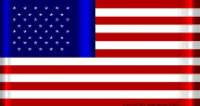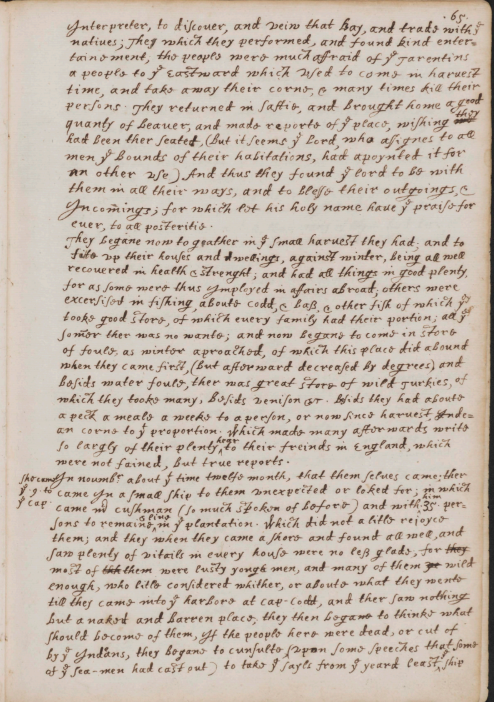PILGRIMS’ WRITINGS SHOW THEY WERE GIVING THANKS TO GOD
Read the story of Thanksgiving from the primary sources – the Pilgrims.
* Pilgrim, Captain and Governor William Bradford wrote the manuscript ‘Of Plymoth Plantation’ [Of Plymouth Plantation]
Digitized page via State Library of Massachusetts:
Online version via Gordon College:

Modern translation:
“After this, on the 18th September, they sent out their shallop to Massachusetts with ten men, and Squanto as their guide and interpreter, to explore the bay and trade with the natives, which they accomplished, and were kindly received. The Indians were much afraid of the Tarantines, a tribe to the eastward, who used to come at harvest time and take away their corn, and many times kill some of them. They returned in safety, and brought home a good quantity of beaver, and reported on the place, wishing they could have settled there. (But it seems that the Lord, Who assigns to all men the bounds of their habitations, had appointed it for another use. And thus, they found the Lord to be with them in all their ways, and to bless their outgoings & incomings, for which let his holy name have the praise for ever, to all posterity.
They began now to gather in the small harvest they had, and to fit up their houses and dwellings against winter, being all well recovered in health and strength and had all things in good plenty. For as some were thus employed in affairs abroad, others were exercised in fishing, about cod and bass and other fish, of which they took good store, of which every family had their portion. All the summer there was no want; and now began to come in store of fowl, as winter approached, of which this place did abound when they came first (but afterward decreased by degrees). And besides waterfowl there was great store of wild turkeys, of which they took many, besides venison, etc. Besides, they had about a peck of meal a week to a person, or now since harvest, Indian corn to that proportion. Which made many afterwards write so largely of their plenty here to their friends in England, which were not feigned but true reports.”
*Pilgrim & Governor Edward Winslow wrote ‘Mourt’s Relation’ (Governor of the Pilgrims several times)
e-book: Mourt’s Relation or Journal of the Plantation at Plymouth (PDF)

Modern translation:
“…our harvest being gotten in, our governor sent four men on fowling, that so we might after a special manner rejoice together, after we had gathered the fruits of our labors; they four in one day killed as much fowl, as with a little help beside, served the Company almost a week, at which time amongst other Recreations, we exercised our Arms, many of the Indians coming amongst us, and amongst the rest their greatest king Massasoit, with some ninety men, whom for three days we entertained and feasted, and they went out and killed five Deer, which they brought to the Plantation and bestowed on our Governor, and upon the Captain and others. And although it be not always so plentiful, as it was at this time with us, yet by the goodness of God, we are so far from want, that we often wish you partakers of our plenty.”
The journal Mourt’s Relation was:
– Written primarily by Pilgrims and Mayflower passengers: Edward Winslow, William Bradford.
– Written between November 1620 and November 1621.
– Describes the landing of the Pilgrims at Cape Cod, their exploring and eventual settling at Plymouth, their building of the Colony, their relations with the surrounding Indians, including the First Thanksgiving.
– Originally printed in 1622 under the tile A Relation or Journal of the English Plantation settled at Plymouth, is the first published account of the coming of the Pilgrims to the New World to settle Plymouth Plantation.
* From the Life and Time of William Brewster, ruling Elder of the Pilgrims who founded New Plymouth, the parent colony of New England, in 1620.
PILGRIMS DECLARE THEIR FIRST PUBLIC THANKSGIVING FESTIVAL IN 1621
In 1621, from the month of May of their first year to November, the prospects of the Pilgrim colony became gradually more encouraging: The first summer’s provisions were gathered; summer breezes and health came to the enfeebled survivors; autumn advanced. Thus, the Pilgrims decide to declare a three-day feast at the end of 1621 to thank God and to celebrate America’s first Thanksgiving Festival.
Text:
“At length, autumn being far advanced, and their first summer’s harvest of Indian corn being gathered in, they fitted their houses, and made their arrangements against the coming winter. And now, while some were employed in service abroad, and some in fishing, to furnish for each family a goodly supply, others again were engaged in hunting, procuring, among other game, water fowl, wild turkey, and venison. Of meal, or Indian corn, one peck a week for each person was the apportioned supply. Of other meal, or wheat, they had none; nor had they any mill for grinding; therefore their corn must be pounded or mashed by their own hands. Yet even this supply, being deemed sufficient for the present colonists, caused some of them to write home to their friends, in England, in more glowing terms than was prudent or warrantable. The effect was, that these descriptions of plenty induced subsequent emigrants to come without bringing with them their needful stores.
The provision for the little colony being secured for the ensuing winter, their governor set apart a day for public thanksgiving. Accordingly, with the fruits of their labors, the thankful feast was prepared, that all might in a special manner rejoice together, under a grateful sense of these tokens of divine mercy. It was their first thanksgiving or harvest festival in the New World. And we may well conjecture what were the feelings, and what the theme of the Elder, as, assembled in their “Common House,” he led the devotions of these worshippers, and spoke to them words befitting the occasion.
The occasion was likewise improved, as a fit time, to interest and favorably influence the neighboring Indians. “Among other recreations,” says Winslow, ” we exercised our arms; many of the Indians coming amongst us, and with them came their greatest King, Massasoit, accompanied by some ninety men, whom for three days we entertained and feasted. They also went out and killed five deer, which they brought to the plantation, and bestowed on our governor, and upon the captain and others. And though it be not always so plentiful as it was at this time with us, yet, by the goodness of God, we are so far from want that we often wish our friends partakers with us.”
Thus are we brought to the conclusion of the first year’s trials, hardships, and sufferings of the pilgrim company, with the loss of life, and the present temporary relief.”
—
Source: Ashbel Steele, Chief of the Pilgrims: Or the Life and Time of William Brewster (Philadelphia: J.B. Lippincott & Co, 1857), pp. 269-270.
MORE
– More on the Pilgrims and God
– More digitized documents of the Pilgrims in Plymouth, Massachusetts via State Library of Massachusetts.








































